Teacher Introduction Letter To Parents
[Your School's Letterhead]
[Date]
Dear Parents and Guardians,
I hope this letter finds you well. I am excited to introduce myself as your child's teacher for the upcoming school year. My name is [Your Name], and I am honored to have the opportunity to work with your child in [Grade/Subject] at [School Name].
Teaching is not just a profession for me; it is a passion. I am dedicated to creating a positive and engaging learning environment where each student can thrive academically, socially, and emotionally. My goal is to inspire a love for learning while providing a strong foundation for [Grade/Subject] that will serve your child well throughout their education.
I have [X years] of experience in education and hold a [Your Degree and Major] from [Your University/College]. I believe in the importance of continuous learning and professional development, and I am committed to staying up-to-date with the latest educational strategies and best practices.
Communication is key to a successful partnership between teachers and parents. I am always here to address any questions or concerns you may have about your child's progress or well-being. You can expect regular updates on classroom activities, assignments, and events throughout the school year. Additionally, I am open to scheduling meetings to discuss your child's individual needs and goals.
Collaboration is at the heart of a thriving classroom community, and I encourage parents to get involved. Whether through volunteering, attending school events, or supporting your child's learning at home, your involvement makes a significant difference in your child's educational journey.
I am truly looking forward to getting to know each student and their unique strengths, interests, and aspirations. Together, we will create a supportive and enriching learning experience that empowers your child to reach their full potential.
Please feel free to reach out to me at [Your Email Address] or [Your Phone Number] with any questions or to introduce yourself. I am eager to begin this school year and work together to make it a memorable and successful one for your child.
Thank you for entrusting me with your child's education. I am honored to be a part of your child's learning journey.
Sincerely,
[Your Name]
[Your Title]
[Grade/Subject]
[School Name]
[Contact Information]
Welcome Back to School - Elementary Teacher
Dear Parents and Families,
Welcome to an exciting new school year in our 3rd grade classroom! I'm Mrs. Johnson, and I'm thrilled to be your child's teacher this year. With eight years of elementary education experience and a passion for nurturing young minds, I can't wait to embark on this learning journey with your amazing children.
This year, we'll explore fascinating topics including multiplication adventures, creative writing workshops, and hands-on science experiments. My teaching philosophy centers on creating a safe, inclusive environment where every child feels valued and encouraged to reach their full potential.
I believe in open communication and partnership with families. Please feel free to reach out anytime via email at [email protected] or through our classroom app. I'll send weekly newsletters every Friday highlighting our learning adventures and upcoming events.
Our classroom operates on mutual respect, kindness, and curiosity. Together, we'll celebrate successes, learn from mistakes, and create lasting memories. I'm looking forward to meeting each of you at our upcoming Open House on September 15th.
Here's to a wonderful year ahead!
Warm regards,
Mrs. Sarah Johnson
3rd Grade Teacher
Room 205
Middle School Subject-Specific Introduction
Subject: Welcome to 7th Grade Mathematics - Ms. Rodriguez
Dear Parents/Guardians,
I am pleased to introduce myself as your child's mathematics teacher for the upcoming academic year. I am Ms. Rodriguez, holding a Master's degree in Mathematics Education with twelve years of teaching experience at the middle school level.
This year's curriculum will cover pre-algebra concepts, geometric reasoning, probability, and data analysis. Students will engage with both traditional problem-solving methods and modern technological tools including graphing calculators and online math platforms.
My classroom expectations emphasize preparation, participation, and perseverance. Students are expected to bring materials daily, actively engage in discussions, and approach challenges with a growth mindset. Late work policies and grading procedures are outlined in the attached syllabus.
Communication is vital for student success. I maintain office hours Tuesday and Thursday from 3:15-4:00 PM for additional support. Parent conferences can be scheduled through our online booking system, and I respond to emails within 24 hours during school days.
Please review the attached materials list and return the signed acknowledgment form by September 10th. I look forward to supporting your child's mathematical growth this year.
Professionally yours,
Ms. Elena Rodriguez
7th Grade Mathematics
High School Advanced Placement Teacher
Subject: AP Chemistry Course Introduction - Mr. Thompson
Dear Students and Parents,
Welcome to Advanced Placement Chemistry. I am Mr. Thompson, your AP Chemistry instructor, bringing fifteen years of high school chemistry teaching experience and a background in chemical research.
This rigorous course prepares students for the College Board AP Chemistry examination in May. We will explore atomic structure, chemical bonding, thermodynamics, kinetics, and equilibrium through laboratory investigations and theoretical applications. Students should expect 2-3 hours of homework nightly and extensive laboratory work.
Success in AP Chemistry requires dedication, strong mathematical skills, and excellent time management. Prerequisites include completion of Chemistry I with a B+ average and concurrent enrollment in Pre-Calculus or higher mathematics.
I maintain high academic standards while providing comprehensive support. Study sessions occur weekly, and I'm available for individual consultations by appointment. All laboratory safety protocols must be strictly followed, and the safety contract requires both student and parent signatures.
College credit potential makes this course invaluable for students pursuing STEM fields. The challenge is significant, but the rewards are substantial. Please attend our mandatory parent information meeting on September 8th at 7:00 PM in the chemistry laboratory.
I look forward to guiding dedicated students through this advanced scientific journey.
Respectfully,
Mr. David Thompson
AP Chemistry Instructor
Science Department Chair
Special Education Inclusion Classroom
Dear Wonderful Families,
Hello! I'm Ms. Martinez, and I'm absolutely delighted to welcome you to our special education inclusion classroom. Every single day, I'm amazed by the incredible progress and unique gifts that each of our students brings to our learning community.
With ten years in special education and specialized training in autism support, behavioral interventions, and adaptive learning technologies, I'm committed to meeting each child exactly where they are and helping them soar to new heights.
Our classroom is built on celebration, patience, and individualized support. We'll work closely together to implement your child's IEP goals while fostering independence, social skills, and academic growth. Communication is my top priority - expect regular updates through our communication log, photos of daily activities, and weekly phone calls.
I understand that entrusting your child's education to someone new can feel overwhelming. Please know that your child's happiness, safety, and progress are my primary concerns. I'm here to listen, collaborate, and advocate alongside you.
Our classroom family includes wonderful paraprofessionals, related service providers, and peer mentors who create an environment of acceptance and joy. I can't wait to share your child's daily victories with you, no matter how small they might seem to others.
Let's make this year absolutely amazing together!
With love and excitement,
Ms. Carmen Martinez
Special Education Teacher
First-Year Teacher Introduction
Dear Parents and Students,
Hi there! I'm Miss Chen, and I am incredibly excited to be starting my teaching career as your 5th grade teacher! While I'm new to the profession, I bring fresh energy, current educational training, and an absolute passion for learning alongside your children.
I recently graduated from State University with my Master's in Elementary Education, where I completed extensive student teaching experiences in diverse classroom settings. My cooperating teachers praised my creativity, organization, and ability to connect with students of all learning styles.
Even though this is my first year, I'm not going it alone. I'm working closely with my mentor teacher, Mrs. Wilson, and have the full support of our amazing grade-level team. I've spent the entire summer preparing engaging lessons, setting up our classroom environment, and learning about each of your children.
I believe that being a new teacher actually brings some advantages - I'm up-to-date on the latest educational research, excited to try innovative teaching methods, and have endless enthusiasm for making learning fun and meaningful.
I promise to communicate openly about our classroom adventures, ask for help when I need it, and always put your child's best interests first. Thank you for trusting me with your precious children during my first year. I won't take this responsibility lightly.
Let's learn and grow together!
Eagerly yours,
Miss Amy Chen
5th Grade Teacher
Mid-Year Transfer Teacher
Subject: New Teacher Introduction - Ms. Parker
Dear Parents and Students,
I am writing to introduce myself as the new 4th grade teacher, effective January 15th. I am Ms. Parker, and I will be continuing the excellent educational foundation that Mr. Davis established during the first semester.
I bring twelve years of elementary teaching experience, including three years specifically in 4th grade. My previous position was at Riverside Elementary, where I specialized in differentiated instruction and project-based learning approaches that I'm excited to implement here.
I understand that mid-year transitions can be concerning for both students and families. Please be assured that I have thoroughly reviewed all student records, IEPs, and ongoing projects. I've met extensively with Mr. Davis and the grade-level team to ensure seamless continuity in your child's education.
My immediate priorities include getting to know each student individually, maintaining established classroom routines, and building strong relationships with families. I will be scheduling brief conferences with each family within the first two weeks to discuss your child's progress and any concerns you may have.
The remaining curriculum includes state history projects, fraction operations, and our spring science fair preparations. I'm committed to maintaining the high academic standards while bringing my own creative teaching strategies to engage and challenge each student.
I look forward to partnering with you for the remainder of this school year.
Sincerely,
Ms. Rachel Parker
4th Grade Teacher
Art/Music/PE Specialist Teacher
Dear Artistic Families,
Greetings! I'm Mr. Williams, your child's music teacher, and I'm practically bursting with excitement for the melodious year ahead! Music has been my passion for over twenty years, and sharing that joy with young musicians is what makes every day feel like a celebration.
In our music room, we'll explore rhythm, melody, harmony, and the pure magic that happens when voices and instruments come together. This year, students will learn to read music notation, play recorder and keyboard, and participate in our seasonal concerts that showcase their growing talents.
Every child is musical - some just haven't discovered their instrument yet! Whether your child is a natural performer or feels shy about singing, I create an environment where everyone can succeed and feel proud of their musical growth.
Our concert dates are already set: Fall Harvest Concert on November 20th and Spring Celebration on May 15th. I'll also be starting an after-school choir for interested 4th and 5th graders, with more details coming soon.
Music education enhances mathematical thinking, improves memory, and builds confidence that extends far beyond our classroom walls. I can't wait to help your child discover the musician within!
Let's make beautiful music together!
Musically yours,
Mr. James Williams
Elementary Music Specialist
Substitute Teacher Long-Term Assignment
Subject: Long-Term Substitute Introduction - Mrs. Foster
Dear Parents,
I am writing to introduce myself as your child's substitute teacher for the next six weeks while Mrs. Thompson is on medical leave. I am Mrs. Foster, a certified teacher with extensive substitute teaching experience in this district.
I want to assure you that your child's education will continue without interruption. I have met thoroughly with Mrs. Thompson to review all lesson plans, classroom procedures, and individual student needs. I am committed to maintaining the same high standards and expectations that have been established.
My teaching background includes five years as a permanent 2nd grade teacher before transitioning to substitute work for family flexibility. I am familiar with the curriculum, assessment schedules, and school policies, which allows me to provide consistent, quality instruction.
Please know that I take this temporary position seriously and am dedicated to providing your children with engaging, educational experiences. I will maintain Mrs. Thompson's communication practices, including weekly newsletters and prompt responses to parent emails.
If you have any questions or concerns during this transition period, please don't hesitate to contact me. I'm here to support your child's continued academic and social growth.
Looking forward to working with your family,
Mrs. Linda Foster
Long-term Substitute Teacher
What is a Teacher Introduction Letter and Why Send One
A teacher introduction letter is a formal or informal communication sent to parents and students at the beginning of the school year or when starting a new teaching position. The primary purpose is to establish initial contact, build rapport, and set the foundation for positive parent-teacher relationships throughout the academic year.
These letters serve multiple crucial functions: they introduce the teacher's background and qualifications, outline classroom expectations and teaching philosophy, provide essential contact information, and demonstrate the teacher's commitment to open communication. They also help ease parental concerns about their child's new teacher and create a welcoming atmosphere that encourages family engagement in the educational process.
When to Send Teacher Introduction Letters
Teacher introduction letters should be sent in several key scenarios:
- Beginning of school year - Most common timing, sent 1-2 weeks before school starts or during the first week
- New teacher assignments - When a teacher is newly hired and assigned to a classroom
- Mid-year teacher changes - When substituting long-term or permanently replacing another teacher
- Subject-specific courses - High school teachers introducing themselves for new semester courses
- Special program transitions - When students enter gifted, special education, or other specialized programs
- School transfers - Teachers new to the school district or building
- Grade level changes - When teachers switch grade levels and meet new student populations
Who Should Send These Letters
Various educational professionals should send introduction letters depending on the situation:
- Classroom teachers - Elementary, middle, and high school teachers introducing themselves to new students and families
- Specialist teachers - Art, music, physical education, library, and other specialists who work with multiple classes
- Special education teachers - Both inclusion and resource room teachers establishing relationships with families
- Long-term substitutes - Teachers covering extended absences who will be with students for several weeks or months
- New hires - Recently graduated teachers or experienced teachers new to the district
- Administrative teachers - Department heads or lead teachers communicating with families about program changes
Who Should Receive Teacher Introduction Letters
The primary recipients of these letters include:
- Parents and guardians - All legal guardians listed in student records should receive copies
- Students - Age-appropriate versions can be shared directly with students, especially in middle and high school
- Extended family members - Grandparents or other family members involved in the child's education
- Caregivers - Anyone responsible for the child's daily care and educational support
- Administrative staff - Copies may be shared with principals and counselors for documentation purposes
How to Write and Send Teacher Introduction Letters
The writing process should begin with gathering information about students and families from previous teachers, school records, and administrative staff. Start with a warm, welcoming tone that reflects your personality while maintaining professionalism appropriate to your grade level and subject area.
Structure the letter logically: begin with self-introduction and qualifications, outline teaching philosophy and classroom expectations, provide practical information like contact details and communication preferences, and end with enthusiasm for the upcoming year.
For distribution, utilize multiple channels: email through school communication systems, printed copies sent home with students, posting on school websites or classroom pages, and inclusion in back-to-school packets. Always follow district policies regarding parent communication and data privacy.
Letter Formatting Guidelines and Best Practices
Effective teacher introduction letters should be 1-2 pages maximum for elementary teachers and potentially longer for high school subject-specific courses that require detailed syllabi. The tone should match your teaching level - elementary teachers can be more casual and warm, while high school AP teachers should maintain formal professionalism.
Essential formatting elements include clear subject lines for emails, proper salutations addressing "Parents and Families" or "Dear Parents/Guardians," organized paragraphs with logical flow, bullet points for important lists like supply needs or contact information, and professional closing signatures with full contact details.
Communication preferences should specify whether you prefer email, phone calls, or written notes, include response timeframes (24-48 hours typical), provide office hours or conference availability, and mention any communication apps or platforms the school uses.
Common Mistakes to Avoid When Writing Introduction Letters
Content mistakes include providing too much personal information, making promises you cannot keep, using educational jargon that parents may not understand, focusing too heavily on rules and consequences rather than positive expectations, and forgetting to proofread for spelling and grammar errors.
Tone problems encompass being too formal for elementary students, appearing unprofessional or overly casual, sounding defensive or apologetic, using intimidating language that creates anxiety, and failing to convey genuine enthusiasm for teaching.
Logistical errors involve sending letters too late in the summer when families are traveling, using outdated contact information, forgetting to include essential details like classroom numbers or school phone numbers, and not considering families who may not speak English as their primary language.
Follow-up Actions After Sending Introduction Letters
Successful teachers follow up their introduction letters with concrete actions that reinforce their commitment to communication and student success. Immediate follow-ups include responding promptly to any parent questions or concerns raised by the letter, confirming receipt of important forms or acknowledgments requested, and being visible during school events like orientation or open house nights.
Ongoing communication should maintain the tone and frequency promised in the introduction letter through regular newsletters, progress updates, positive phone calls home, and prompt responses to parent inquiries. This consistency builds trust and demonstrates reliability.
Documentation involves keeping copies of all introduction letters for reference throughout the year, noting which families responded with questions or concerns, and tracking any special circumstances or requests mentioned in parent replies to ensure individual needs are met.
Advantages and Disadvantages of Teacher Introduction Letters
Primary advantages include establishing positive first impressions before meeting families in person, reducing parent anxiety about new teachers or school years, providing essential information efficiently to all families simultaneously, demonstrating professionalism and organization, and opening communication channels early in the relationship.
Potential challenges involve time investment required for personalized, quality letters, possible language barriers for non-English speaking families, risk of creating unrealistic expectations, potential for misinterpretation of tone or intent, and the need for follow-through on all promises made in the letter.
Long-term benefits significantly outweigh temporary challenges, as these letters establish foundations for strong parent-teacher partnerships, improved student outcomes, and more effective classroom management throughout the year.
Essential Elements Every Introduction Letter Must Include
Teacher information should provide full name and preferred title, relevant educational background and teaching experience, teaching philosophy or approach summary, and contact information including email, phone, and classroom location.
Classroom details must outline grade level and subjects taught, basic daily schedule or class periods, general curriculum overview for the year, classroom expectations and behavioral guidelines, and communication policies including response times and preferred contact methods.
Practical information includes supply lists or materials needed, important dates like conferences or field trips, homework policies and expectations, grading procedures and report card schedules, and any special programs or certifications relevant to the position.
Engagement opportunities should mention volunteer possibilities, upcoming events or meetings, ways parents can support learning at home, and invitations for questions or conferences.

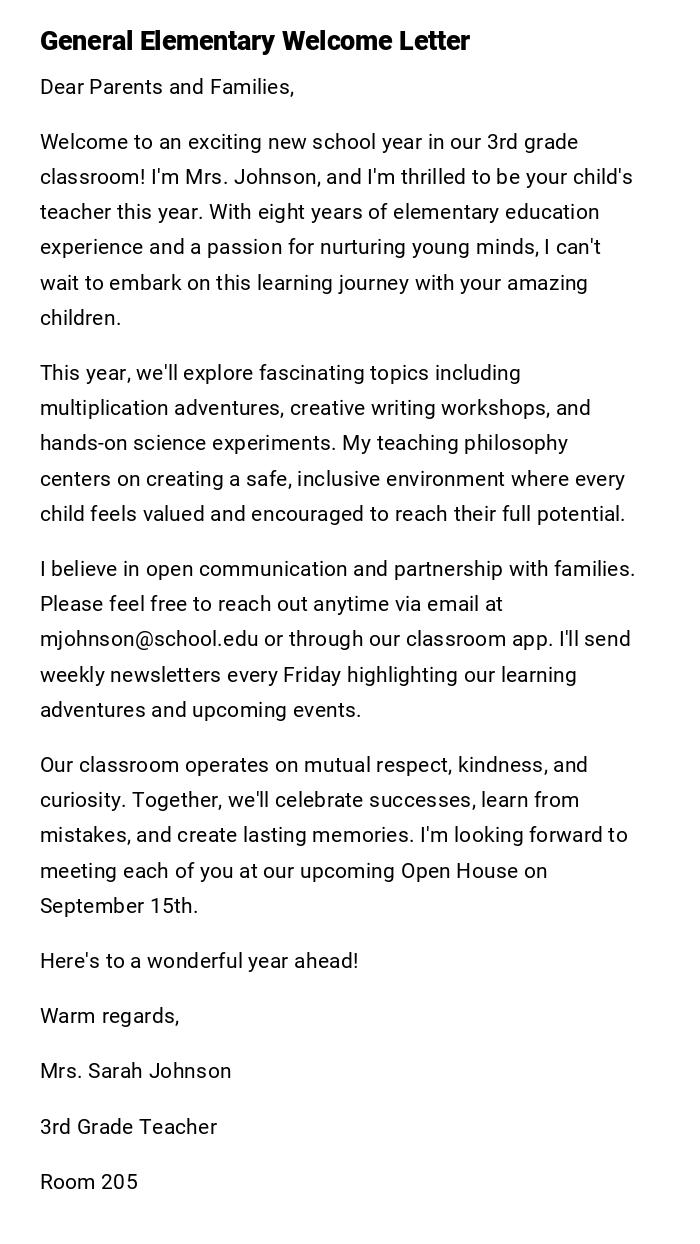
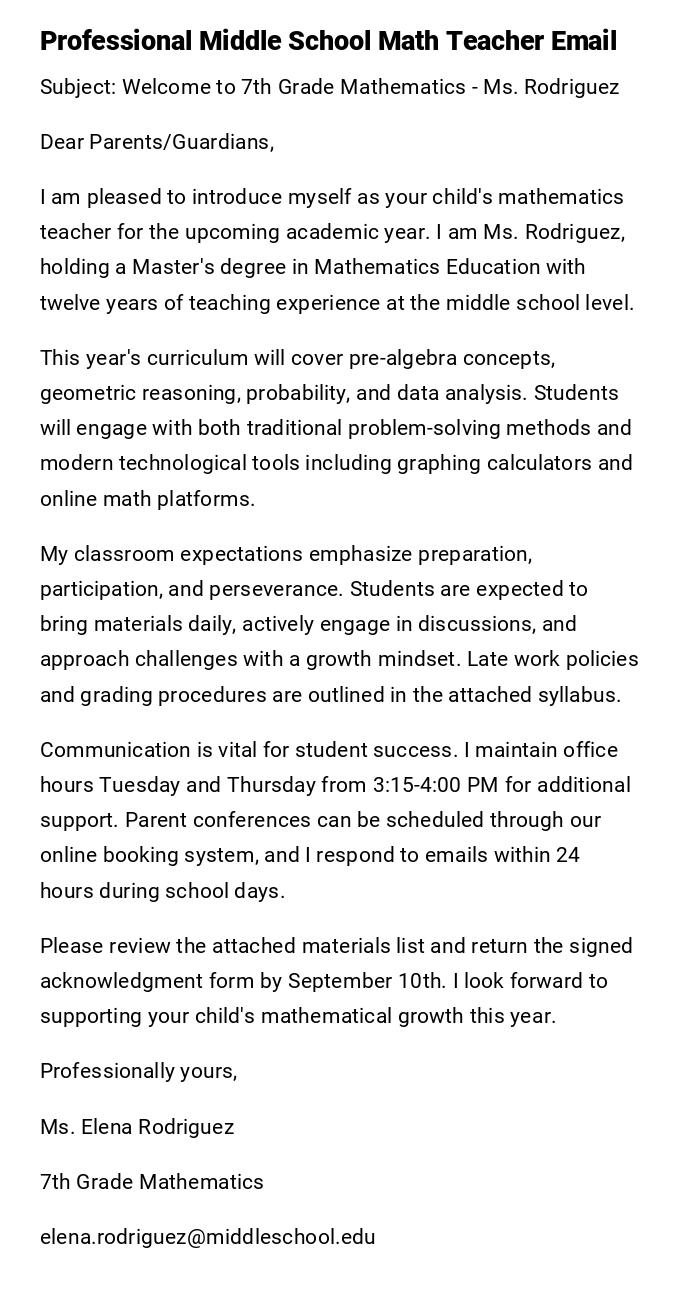
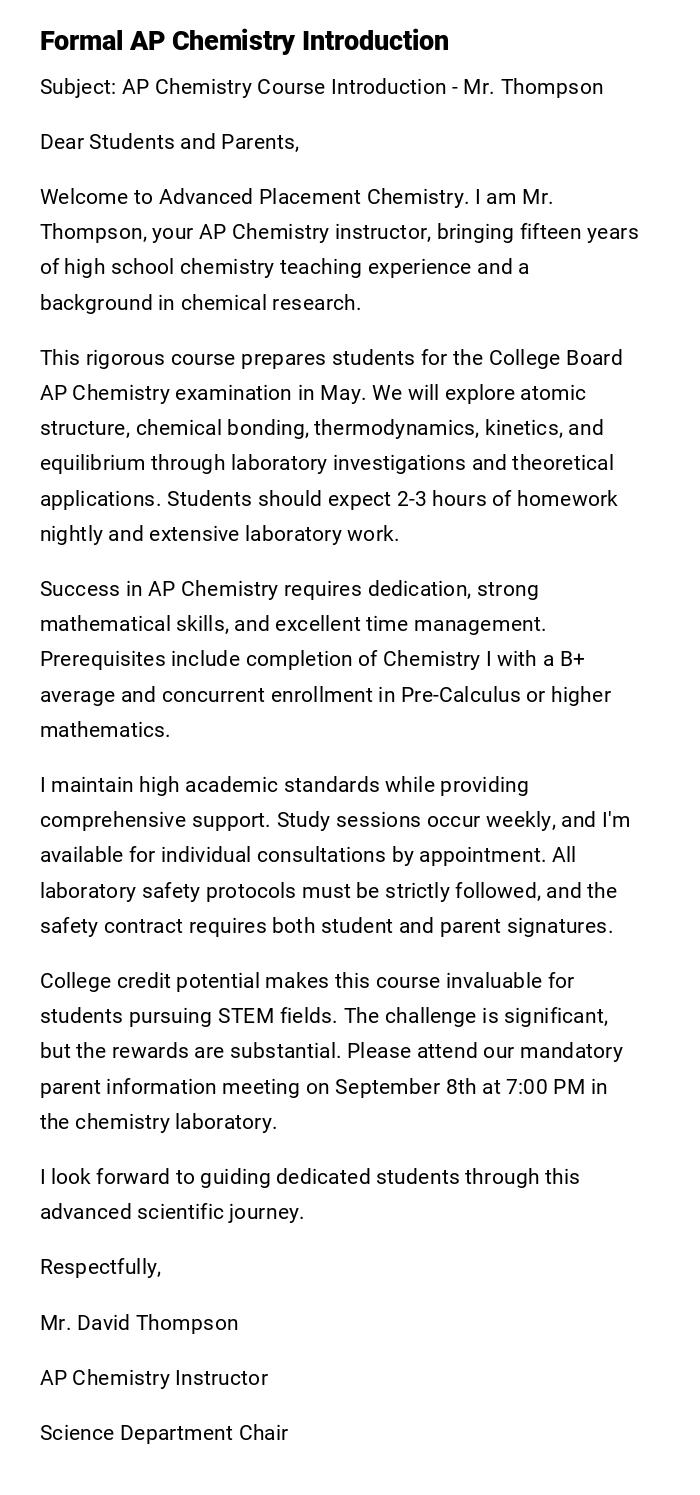
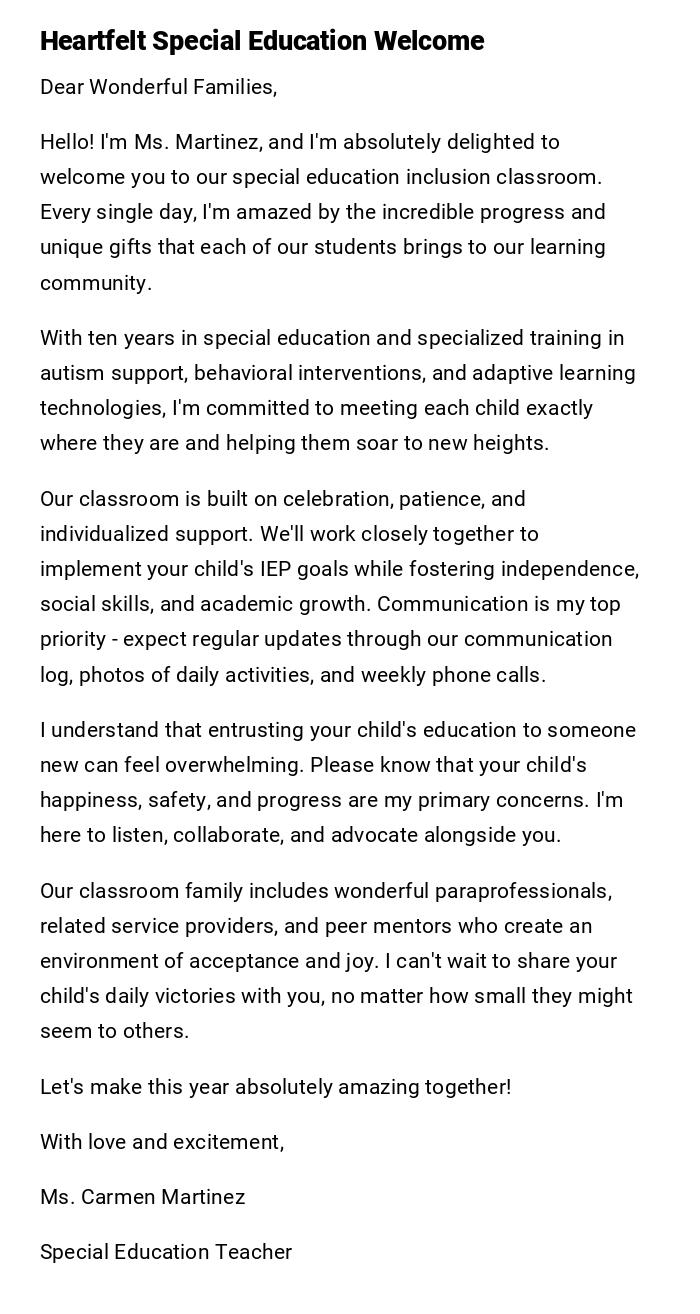
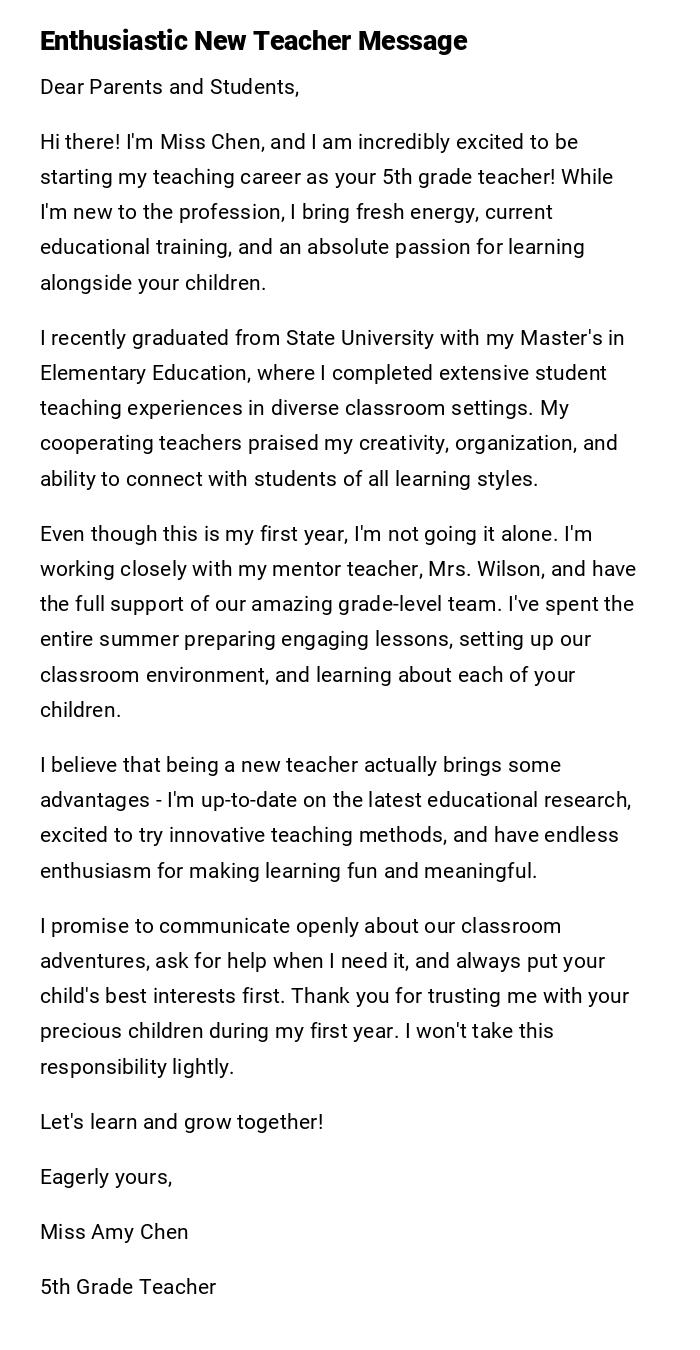
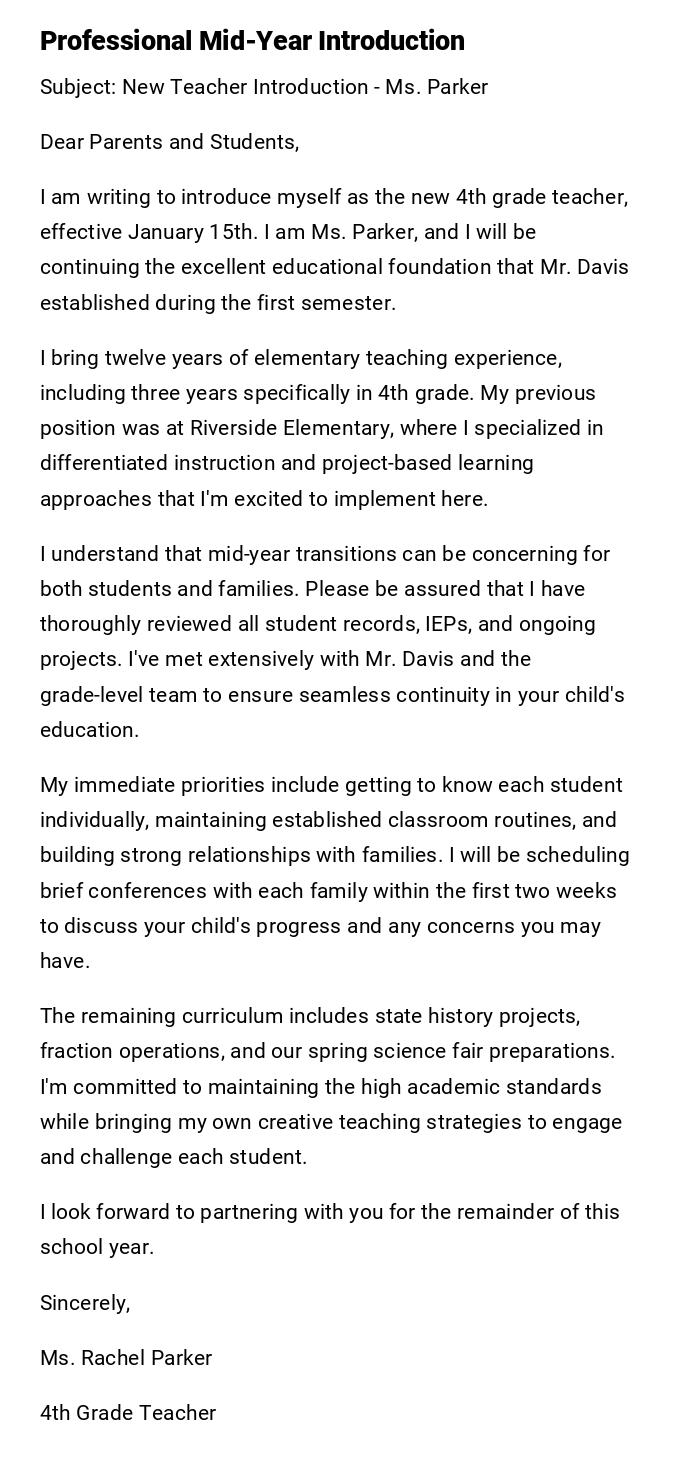
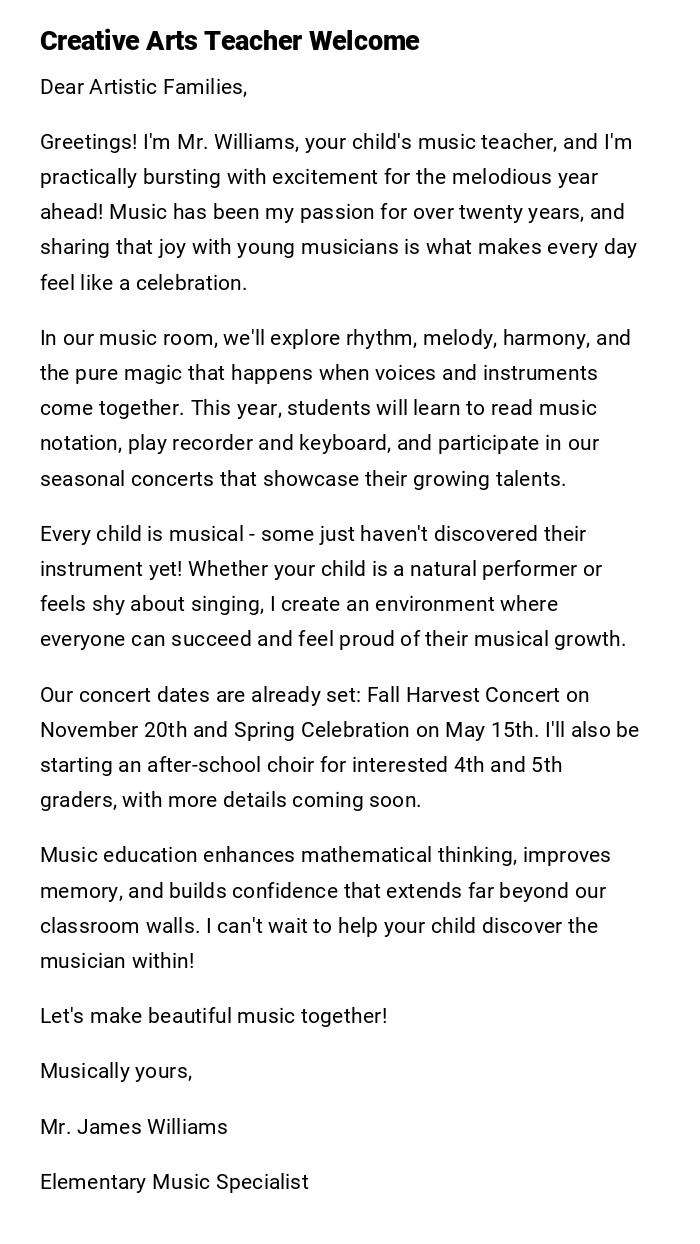
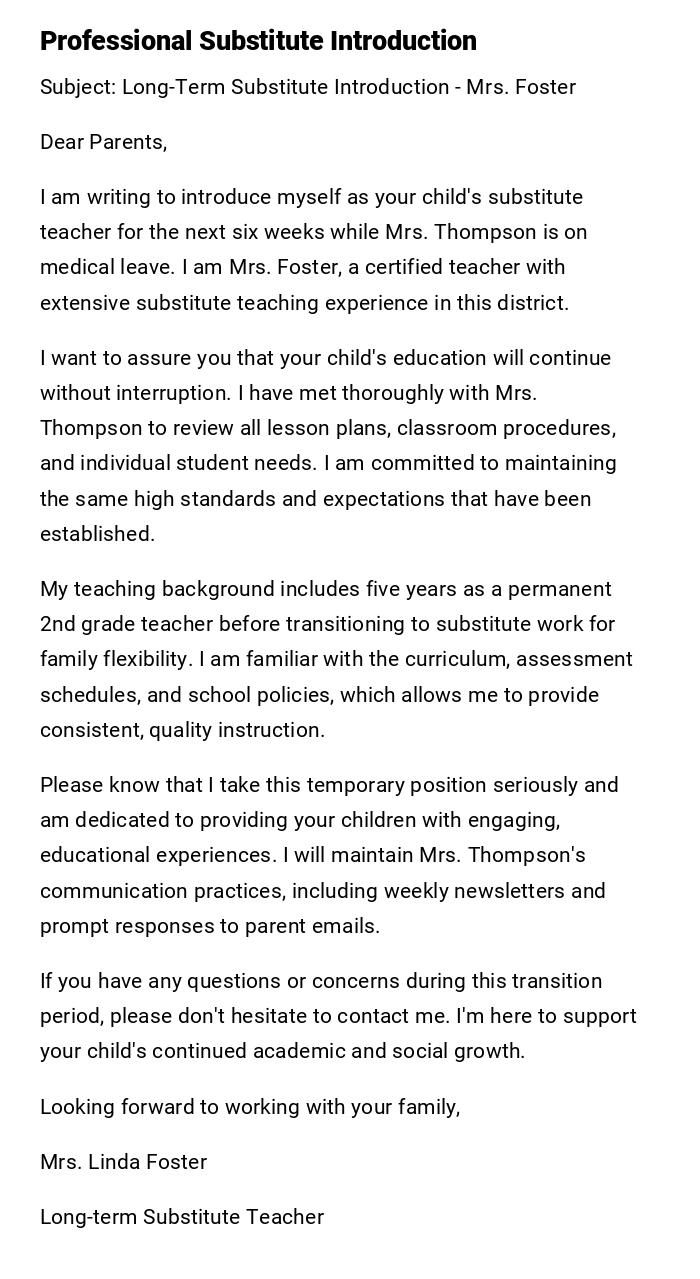

 Download Word Doc
Download Word Doc
 Download PDF
Download PDF